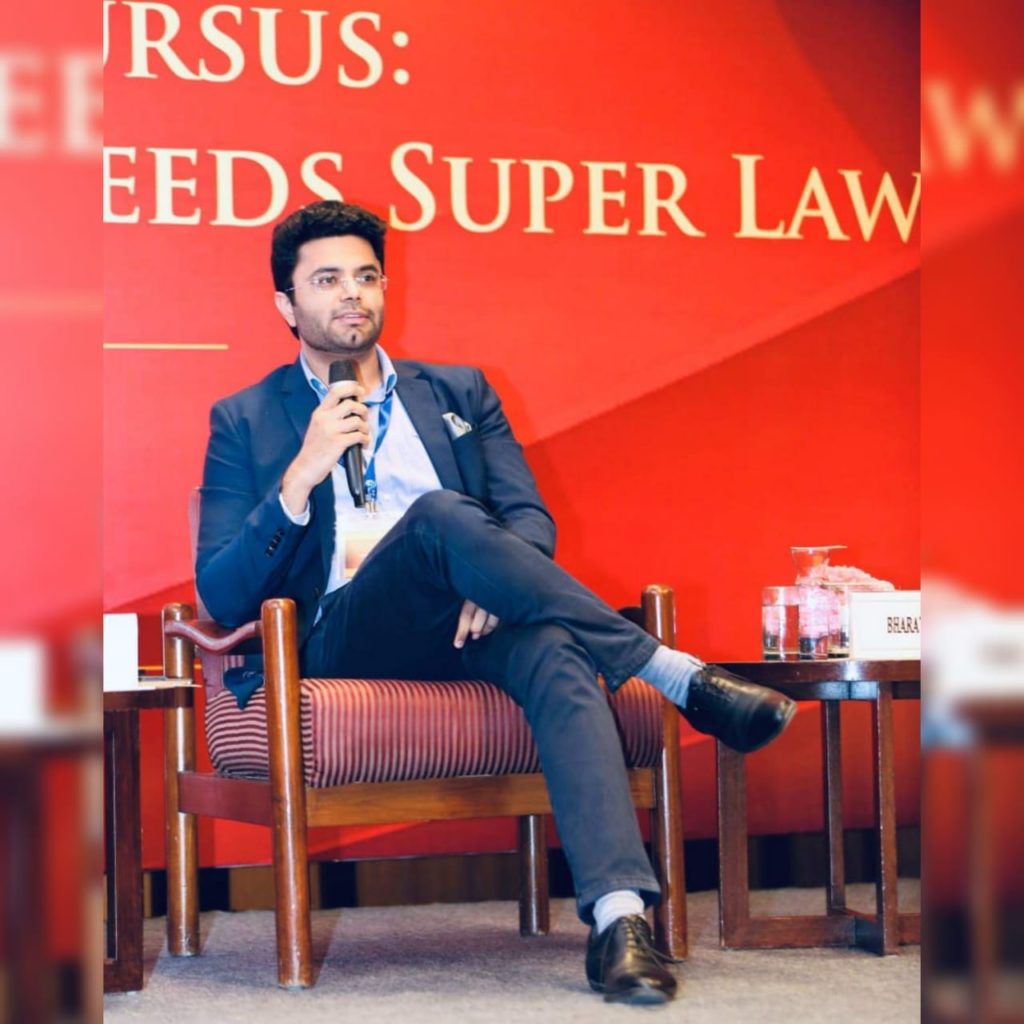Bharat Chugh is a former Judge who enjoys recognition for topping the toughest Judicial Examinations in India-Delhi Judicial Examination at a tender age of 23-being the youngest in his batch to do so. He is Partner of L&L Partners who is one of the top law firms in India.
The polymath is also an ardent writer who loves penning down issues which stir him in his blog. Here is a piece of conversation Desi Kaanoon had with the amazingly inspiring Mr. Chugh-
Q. How does it feel to have cracked the Delhi Judicial Services Examination with Rank 1 and being one of the youngest ever?
Ans: It was breathtaking. Delhi Judicial Services (“DJS”) exam is inarguably the toughest judicial service exam in the country and one with an infinitesimal pass percentage. I was quite elated. I was (and still am) really passionate about being able to use my skill at law to make a meaningful difference to people’s lives and dispense justice. I was fascinated with the idea of how a judge breathes life into the dead letters of law by creative interpretation, fashions remedies (where there were apparently none) and does substantial justice. I have seen a lot of injustice and inequity early on in my life, my heart used to be rankled at each injustice. Being at DJS was a beautiful opportunity to be a part of the solution and make a positive difference. It’s a service that allows one an enormous ability to correct injustices, contribute to the evolution of law, and at the same time, quench one’s penchant for writing.
DJS gives one that opportunity. It attracts some of the best talent, and the training and the overall experience of judging here at Delhi, is quite enriching personally and extremely rewarding.
Q. What do you think are the three paramount qualities a judicial aspirant must possess to be able to make it through any Judicial Services Examination?
1. A passion for law and a belief in its transformative powers.
2. A heart that beats for the disenfranchised and the underdog; the almost missionary zeal to do justice and to ensure that the last man gets his due (in trust for whom – one holds the position of a judge);
3. Grit. There is no substitute for hard work in law. I’ll quote Justice Joseph Story when he said “The law is a jealous mistress and requires a long and constant courtship. It is not to be won by trifling favors, but by lavish homage.”If you are able to do that – there is little else that you’ll need ever again.
Q. We would like to exploit your expertise in Extradition Laws by soliciting your opinion regarding Vijay Mallya’s UK extradition appeal.
A. While I’m not aware of the specifics of this case, having dealt with quite a few extradition matters, I really think that we, as a country, need to really get our act together as far as our extradition requests are concerned. The sheer number of cases where India has lost out on extradition – for technical reasons – is disconcerting. To illustrate – we’ve lost out on execution for reasons as preposterous as improper recording of evidence, lapses in an investigation, failure to bring the necessary material before the foreign extradition court justifying extradition. We’ve also lost quite a few extradition requests due to the terrible state of our prisons, which makes any country, which has a strong human rights jurisprudence, is really disinclined to extradite to India. Further, many cases here in India are perceived to be politically motivated and that becomes a good ground for denial of extradition. In short, the list of objections that a smart extradition lawyer can take up – to prevent extradition – is immense. On a more broader plane, this does not reflect well on our extradition preparedness and overall – the state of rule of law in the country.
Q. How do you cope up with bad/down times and what is your motivation key in such situations?
A. As someone wise said (possibly, my mother!) – “never let a good crisis go to waste”. Each difficulty presents an opportunity. What may, on first blush, look like an insurmountable obstacle can be turned into an opportunity to be better. And, if you overcome the chaos, the returns are breathtaking. Having had my share of difficulties in life (an education in the university of adversity and hard knocks of life) I can vouch for this.
Q. You have been into active blog writing. What issues/ concepts do you write on and how do you choose them?
A. A practising lawyer’s language is his foremost stock in trade. The ability to articulate even the most complex of issues – clearly and succinctly – is extremely important for a lawyer. So is the art of story-telling. The most successful lawyers are often the people who know the most and can present it most articulately and in a way that captures the imagination of the Court, the client and everyone else.
On topics: I love to write on almost everything. I’ve written extensively on issues around trial judging and procedures. My favourite areas in law are criminal law, tech and arbitration and I love to write about those.
In short, my mantra of writing is to take up a complex issue and demystify it; make it accessible and fun to read. Also, since it’s best to ’show’ than to ’tell’, I love to bring in story-telling into my writing, even if it’s piece on a very dense and nuanced legal issue. It’s an important skill for a lawyer to cultivate.
By- Priya Chaudhary

